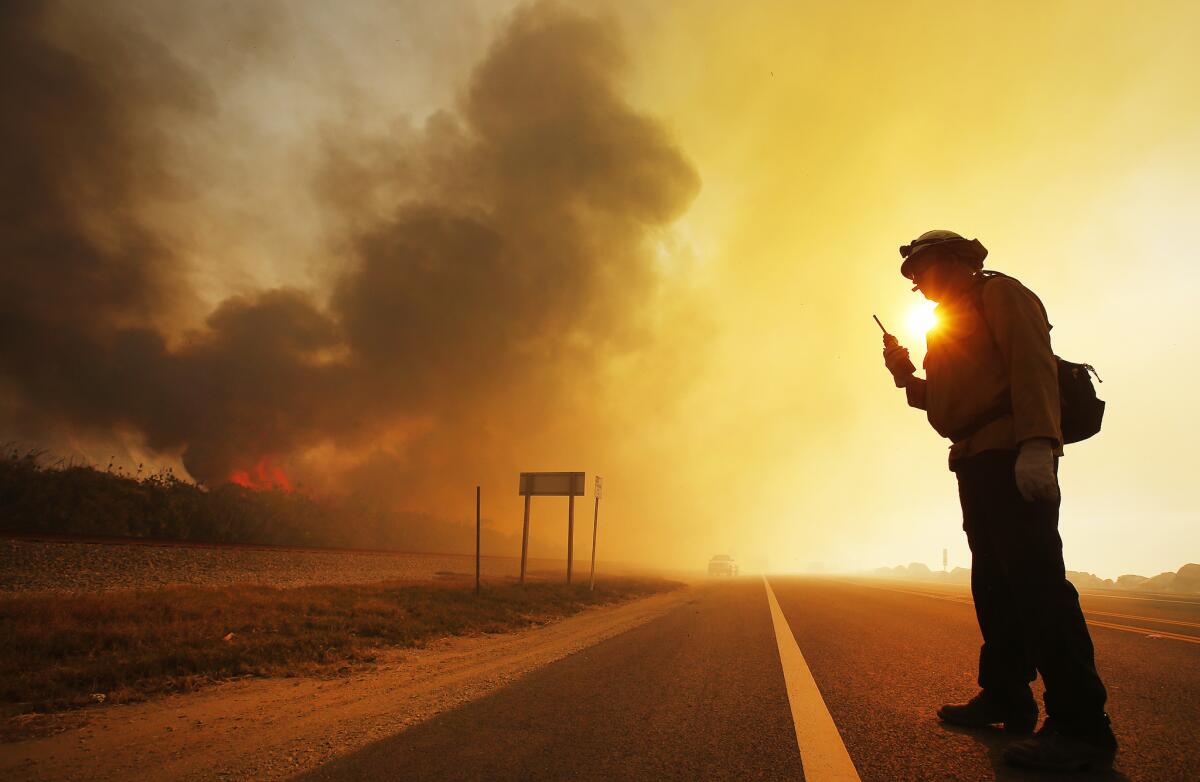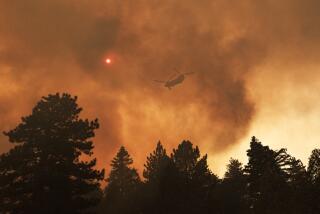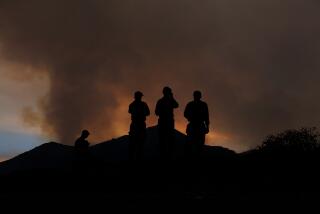Even the pet chihuahua needs a face mask as fires create terrible air quality

Reporting from CARPINTERIA, CALIF. — At the Casitas Shopping Center, more than 100 people stood in a line that stretched from Albertsons to a doughnut shop on the corner.
The residents were there to collect masks as smoke and ash from the Thomas fire affected the air quality in the city.
Among them was Gloria Rivera, who said she learned about the mask distribution through Facebook.
Rivera, who is short with black curly hair, said she came to grab masks for herself, husband and two grandchildren.
Even one for her chihuahua Mamba.
“I’m gonna try and put it on him,” she said.
Rivera said she lives in an area where voluntary evacuations have been issued. She said she left home Wednesday as a precaution but returned Thursday to check on her house. She has since decided to stay at home.
Also collecting masks for her family was Concepcion Theresa Sexton, who said her daughter, son-in-law and three grandchildren were evacuated from Ojai and staying with her until they can return.
She said she won’t be affected by the fire but air quality has been a major concern for her.
Volunteers with the Community Response Team handed out green masks to residents and at times people drove by as if it was a drive-through for masks.
Organizers said they have 3,000 masks that they plan to hand out. They said they have masks for adults and children.
Hospitals across Southern California reported high numbers of patients showing up in the emergency room with breathing problems due to wildfires that broke out this week.
Health officials in Ventura, Los Angeles and Santa Barbara counties warned of high pollution levels because of smoke. The microscopic particles that are in smoke can penetrate deep into people’s lungs, creating a hazard for those who already have heart or lung problems such as asthma, emphysema or chronic obstructive pulmonary disease (COPD).
The Skirball fire that has now burned 475 acres broke out above the UCLA campus, in Bel-Air. The university lost power and canceled classes. The smell of smoke lingered in the medical buildings. After the fire began on Wednesday, a 5-year-old was admitted to UCLA Medical Center-Santa Monica because the child was struggling to breathe, said UCLA health spokeswoman Amy Albin.
In Westwood, Ronald Reagan UCLA Medical Center treated five patients with asthma attacks on Wednesday, and UCLA’s urgent care clinic in Century City administered breathing treatments to a handful of walk-in patients through Thursday, Albin said.
Health officials advised that people in the area as well as in Malibu and Santa Monica stay indoors, even when smoke or ash couldn’t be seen or smelled. Inhaling smoke can cause chest pain, shortness of breath, coughing and wheezing. Officials also warned of particularly bad air quality in the San Fernando Valley.
The Creek fire, which has now burned more than 15,000 acres, broke out Tuesday in Sylmar. Twenty-five patients showed up to the Providence Holy Cross Medical Center in Mission Hills on Tuesday complaining of smoke-related problems, said hospital spokeswoman Patricia Aidem.
The hospital also set up a hotline Tuesday to field questions about air quality and has answered about 20 inquiries from patients, she said. Jack Hagerman, spokesman for Valley Presbyterian Hospital in Van Nuys, said the hospital was offering face masks to employees, patients and visitors. He said they also put air purifiers in high-risk areas of the hospital to keep the air as clean as possible.
“To limit smoke coming into the building, we’ve closed all of our exits except for our main entrance and entrance to the Emergency Department,” Hagerman said in an email. “We’ve added fans at those entrances to discourage outside air from traveling inside.”
Health officials advise that people limit their outdoor activity, close windows and use air-conditioning that recirculates inside air, and wear N95 masks outside that can protect from harmful particles.
More to Read
Sign up for Essential California
The most important California stories and recommendations in your inbox every morning.
You may occasionally receive promotional content from the Los Angeles Times.












